#Saudi Press Agency
Explore tagged Tumblr posts
Text
Daily update post:
I have to start this one with the sad news that the hero who saved others by stopping the terrorist yesterday, despite being stabbed in several places (including in the neck), has passed away. His name was Uri Moyal, he was 51 years old, he leaves behind a wife and three kids. Yesterday, the number of wounded was still not fully clear, today it's confirmed that in addition to Uri, the terrorist managed to injure 2 more people. In the pic below you can see Uri holding up a lifetime achievement award. At his funeral today, his daughter Sapir mourned him: "Thank you for being a dad, who was also a teacher for life. There is no one who knew you and didn't fall in love with you."
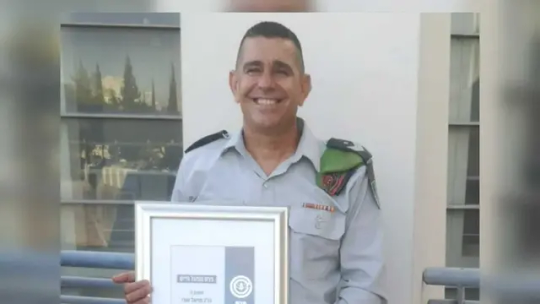
The German press has reported (so far I've only managed to find this English source) that this week, the antisemitic, genocidal slogan "From the river to the sea" has been found painted in Arabic on the site of the 1972 kidnapping and massacre of 11 Israeli athletes by Palestinian terrorists. I'll point out that recently, the grandson of one of the murdered athletes was attacked (he had several bones in his face broken) in Berlin by an Arab anti-Israel activist.
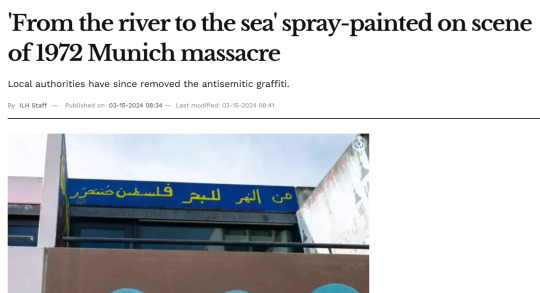
A terrorist attack was prevented from happening, when two Palestinians, carrying a big knife and a sword, were arrested on their way to a Jewish community in the middle of the night. They're currently being questioned.
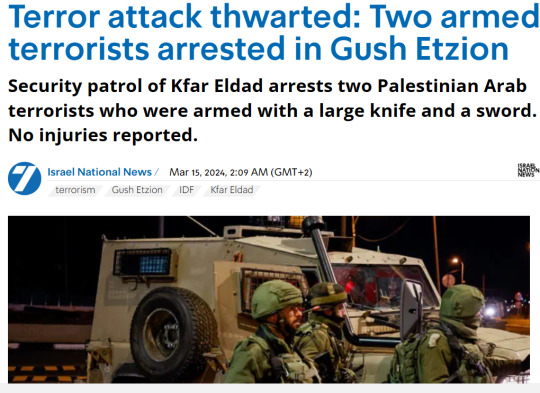
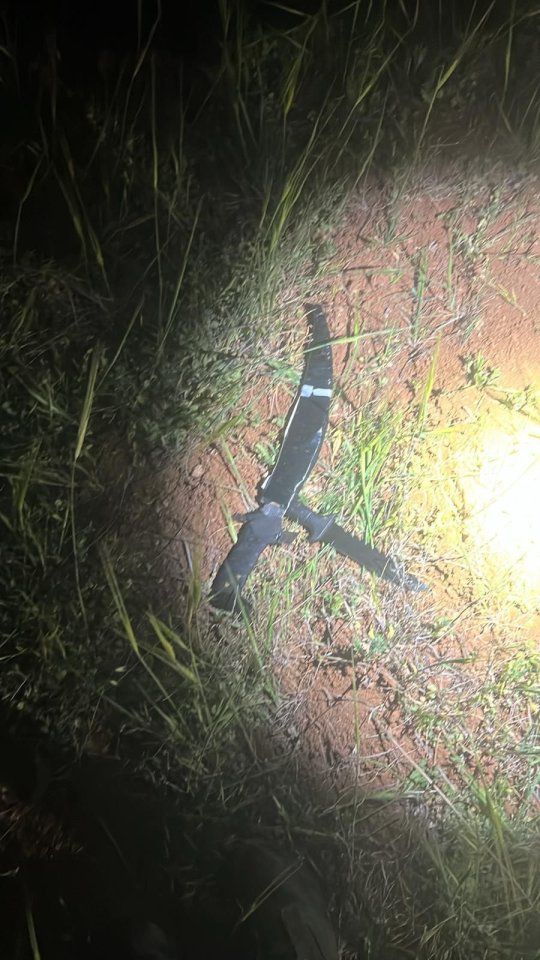
After Canada and Sweden, now Australia has also announced that it will renew its funding of UNRWA. I may sound like a broken record, but this is morally broken. They KNOW that UN agency is complicit in countless crimes of helping anti-Jewish hate and violence, the IDF evidence uncovered thanks to the war are just the tip of the iceberg when we're actually talking about decades of complicity, and resuming the funding without any changes, without even an investigation into this being completed, means these countries don't even care about looking as if they care about Jewish and Israeli lives. It's beyond ccontemptible. So. Canada, Sweden and now Australia, whenever these countries' heads tell you that they care about human rights, know that this includes, "but not for Jews."

And because I mentioned the long, long complicity of UNRWA (and many in charge of or dealing with it), here's the CEO of the NGO UN Watch explaining it better than most can, because they have been working for years on calling attention to the wrongdoing of UNRWA:
There's this common lie spread by the anti-Israel crowd, that everything was just peachy between Jews and Muslim in the Middle East, until Zionism came along. This is a blatant erasure of repeated discrimination, persecution, forced conversions, expulsions and massacres perpetrated against Jews living in Muslim majority countries for centuries. The ethnic cleansing of the entire Middle East of Jews (other than in Israel) is only the climax of that long history of antisemitism under Muslim rule, exactly like the Holocaust is just the climax of the long history of antisemitism under Christian European rule. And yesterday, I came across another reminder.
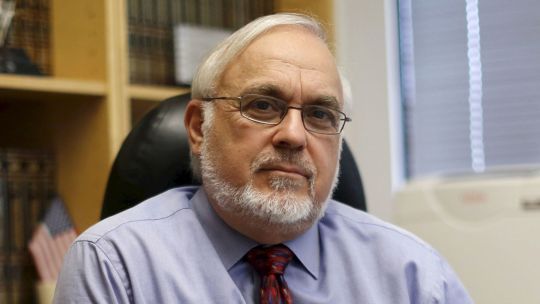
I was listening to an interview with Rabbi Abraham Cooper, an American rabbi, about the discrimination he had recently suffered during a trip to Saudi Arabia. I'd read the headlines, but hearing him tell it in his own words (in amazing Hebrew, might I add) really drove it home. He was heading a US delegation meant to inspect the state of religious freedom in Saudi Arabia, when he gets a phone call from the Saudi Ministry of Foreign Affairs, telling him that the Saudis have laws which must be respected, and which dictate that no one but "the members of our religion" (meaning, Muslims) can walk around publicly displaying signs of their religious identity. In other words, Rabbi Cooper was told to remove his kippah (the head cover religious Jews wear). Rabbi Cooper asked the official on the phone, whether he was sure, and tried arguing against this decision. When the demand was reaffirmed, Rabbi Cooper responded that he wouldn't take off his kippah for the Soviets decades ago, and he wouldn't be taking it off for the Saudis, either. That meant he had to leave, and so the delegation had to end its visit. This isn't a small incident of anti-Jewish discrimination in the 1930's, in an Arab country where no one would even bat an eye at that. This is a Saudi official, speaking to an American Jew, in 2024, during an official visit, meant to check the state of religious freedom in that country, while Saudi Arabia is doing its best to present a more tolerant, modern and progressive image for the world. And this still happened. There is a long tradition of antisemitism in the Middle East, it doesn't simply disappear even when Jews were forced to, and the attempts to deny it with the excuse of "But Zionism!" are antisemitic, too.
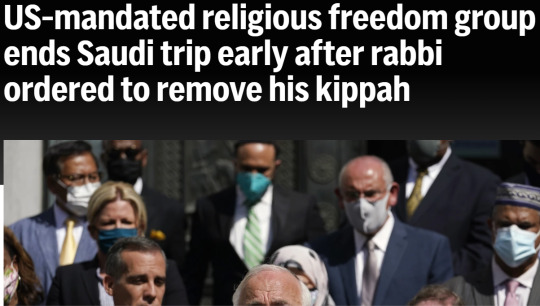
This is Hadar Gadol.

He's an Israeli author, a practitioner of alternative medicine, and as a reservist, he serves as a casualty officer (an army official who lets a family know that their loved one was killed in combat, in Israel a casualty officer also continues to work with and support the family after the initial notification, kind of like a social worker appointed by the army). In January, IDF soldier Mark Kononovich was killed. A few weeks ago, as party of taking care of the family, Hadar took Mark's dad Alex on a tour of the last army post where Mark and the friends who died with him had slept. In the middle of that, Hadar got a heart attack. Alex happens to be a doctor, he recognized the signs, administered some first aid, and made sure Hadar would be taken to the hospital to receive the treatment he needed. This is Hadar after being released from the hospital, visiting Alex to thank him (you can also see Mark's younger brother in the pic):
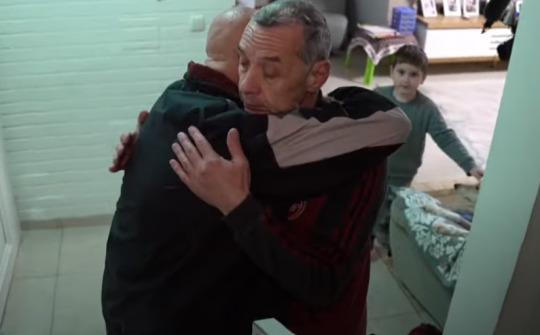
During this visit, Alex told Hadar, "You took our case as very close to you, you felt it like we do, very close to the heart." I have no doubt their bond is gonna be there for years to come. Hadar is actually not the first Israeli casualty officer I've heard of, who collapsed and was in need of hospitalization since Oct 7, just the latest. I think that in a way says something about how acutely Israelis feel the pain of the massacre, whether we personally lost someone or not.
(for all of my updates and ask replies regarding Israel, click here)
#israel#antisemitism#israeli#israel news#israel under attack#israel under fire#terrorism#anti terrorism#hamas#antisemitic#antisemites#jews#jew#judaism#jumblr#frumblr#jewish#unrwa#resources#un
81 notes
·
View notes
Text
Saudi Arabia said Sunday that more than 1,300 faithful died during the Hajj pilgrimage which took place during intense heat, and that most of the deceased did not have official permits. "Regrettably, the number of mortalities reached 1,301, with 83 percent being unauthorised to perform Hajj and having walked long distances under direct sunlight, without adequate shelter or comfort," the official Saudi Press Agency reported. An AFP tally last week, based on official statements and reports from diplomats involved in their countries' responses, put the toll at more than 1,100.
Continue Reading.
36 notes
·
View notes
Text
[Al Arabiya is Saudi State Media]
Saudi Arabia said early Friday that it was following with “great concern” the military operations taking place in the Red Sea region and the airstrikes on several sites in Yemen.
“While the Kingdom stresses the importance of preserving the security and stability of the Red Sea region, in which freedom of navigation is an international demand [and of] interest of the entire world, [Saudi Arabia] calls for restraint [sic] and avoiding escalation in light of the events the region is witnessing,” a statement carried by the Saudi Press Agency read.
12 Jan 24
38 notes
·
View notes
Text
This week, as several European governments announced their plans to formally recognize the state of Palestine, the United States continued to press against the current. Earlier this month, the United States stood almost alone in its refusal to grant the Palestinian people an equal seat among the community of nations. The United Nations General Assembly approved its support of Palestinian statehood 143 to 9, with 25 nations abstaining. The thunderous applause that followed the vote marked both a celebration of international support for Palestinians and a protest against Israel and the United States.
Yet that vote was mostly symbolic. Full membership must first be approved by the U.N. Security Council, where the United States holds veto power. Back in 2011, the mere threat of an American veto sufficed to kill Palestine’s application for U.N. membership, but this April the Biden administration was obliged to cast the single vote that blocked Palestinian statehood.
America’s official position is that Palestinian statehood should be achieved through negotiations between Israelis and Palestinians. This stance is particularly ironic considering that the United States was the first government to recognize Israel in 1948, despite President Franklin D. Roosevelt’s earlier assurances to Saudi King Abdul Aziz ibn Saud that the United States would not intervene. Today, the Saudis demand that Israel support the two-state solution as a condition for advancing a regional security treaty they see as a means of countering extremism. But in effect, America has outsourced its veto power to Israel’s extremist government, framing statehood as a gift to be granted to Palestinians at the will of their occupier.
As a Palestinian American and an Israeli, working in partnership, we believe that no one—not Israel and not the United States—should be allowed to veto the Palestinian right to self-determination. To do so undermines not only Palestinian rights, but also Israeli and American interests.
The Palestinian interest
The failures of the Oslo Accords, reached in the mid-1990s, and subsequent decades of international neglect have sidelined the so-called Palestinian problem. The massacres and destruction that erupted with the Hamas attacks on Oct. 7, 2023—further escalated with Israel’s onslaught against Gaza—reminded the world that one of its longest-running conflicts will not magically disappear. Now, some 40,000 lay dead, twice as many are physically injured, and more than a million are displaced and on the brink of starvation. With Gaza in ruins, and the war still raging on, those who survive are left with not much more than deep despair and a desire for vengeance.
Statehood provides Palestinians with political agency that is not rooted only in violence. It offers them a path to self-determination with true political agency and dignity. Statehood also opens the door for a new generation of Palestinian leaders to move forward. In 2012, Palestine became a U.N. nonmember observer state, allowing it to later join the International Criminal Court and demand accountability under international law. Full membership in the world’s most important political body is not a panacea, but it would provide Palestinians with diplomatic tools that they currently lack and that could become crucial once negotiations with Israel finally start. More urgently, full statehood resists Israel’s attempts to paint all of Gaza’s remaining public infrastructure and public life as a terrorism threat. This makes statehood an essential vehicle for reaching a sustainable cease-fire, for ending the war, and for administering the physical and political reconstruction of Gaza. This is quite the opposite of the ridiculous attempts to frame statehood as a “reward for terrorism,” as Israeli hard-liners often depict it. Palestinians deserve a path toward a future that is not soaked in blood and empty promises.
And, frankly, so do Israelis.
The Israeli interest
In the wake of the Oct. 7 attacks, Prime Minister Benjamin Netanyahu and his extremist government have exploited Israelis’ collective trauma and survivors’ guilt. Netanyahu’s efforts to avoid accountability for personal corruption, combined with his administration’s push toward annexation and authoritarianism, have strained a democracy already weakened by more than half a century of military occupation. Despite last year’s widespread protests against the government’s attempts to overhaul the judicial system, most Israelis fail to connect the occupation with the anti-democratic shift, the security failures since Oct. 7, and the rampant racism and social polarization in society. These trends are reinforced by police violence against protesters and the suppression and vilification of speech critical of the war effort, particularly on the part of Palestinian citizens of Israel.
Yet calls for recognizing Palestinian statehood are still being sounded both in the streets and online. As Minister of Finance (and extremist settler) Bezalel Smotrich starkly noted in a recent meeting with settler leaders, the growing recognition of Palestinian sovereignty around the world is making Palestinian statehood a “tangible, developing danger.”
But in truth, the greatest danger to Israel is Netanyahu’s ongoing sabotage of Palestinian political aspirations, a policy that strengthens both Israeli and Palestinian extremists, perpetuates war, and destroys the lives and livelihoods of those it pretends to protect. It may be leading the state founded to prevent a second genocide against the Jewish people to perpetrate one against another people. And it is recklessly isolating a small nation from its most loyal international allies, including U.S. President Joe Biden.
The American interest
Recognizing Palestinian statehood is not just another bargaining chip for pleasing the Saudis. It could indeed restore America’s diplomatic leadership and help recalibrate its global influence, leveraging positions against Russia and Iran, and even countering Chinese designs on Taiwan. The ongoing funding of two wars—one in Gaza and the other in Ukraine—is economically unsustainable and politically detrimental. Indeed, Biden’s current strategy toward Israel is alienating his progressive base and provides fodder for his political opponents. In characteristic doublespeak, Republican presidential candidate Donald Trump has criticized Biden’s handling of the war from multiple angles, encouraging his followers as they chant “Genocide Joe,” and then blasting Biden for postponing weapons shipments to Israel.
A bold step toward supporting Palestinian statehood could decisively shift the narrative. It would finally present the U.S. president as standing on the right side of history, and it would help him secure more political support domestically and internationally.
Some might insist that now is not the right time for intricate statecraft, as children are starving in Gaza. But at this historic moment, a mere cease-fire is simply not enough. We finally have the diplomatic opportunity, the political leverage, and the moral imperative to support transformative change. Biden risks not just his own reelection but the moral standing of the United States on the global stage. If his reelection bid fails, a reinvigorated Trump presidency would wreak havoc on the international order—including the cause of Palestinians.
Toward two states, and a land for all
If it’s difficult to imagine Israelis and Palestinians having shared interests and acting on them at this fraught moment, our organization can serve as an example. Both of us are board members of A Land for All (ALFA), a Palestinian/Israeli movement dedicated to peace, equality, and mutual self-determination for everyone living between the Jordan River and the Mediterranean Sea. We advocate creating a sovereign Palestinian state alongside Israel, with borders based on the 1967 lines. We also believe that many of the long-standing obstacles to a negotiated agreement can be overcome by establishing a two-state confederal union that guarantees freedom of movement and residence for both peoples across our shared homeland.
Achieving this vision will obviously not be easy, but the first step is clear. It is within Biden’s power to propose a new U.N. Security Council resolution recognizing a Palestinian state. If Biden is a true friend of the Israeli and Palestinian people, he must act now. It’s the right thing to do, and it might help save his reelection campaign.
18 notes
·
View notes
Text
The two Egyptian inmates ate a routine final dinner in a prison in northern Saudi Arabia, not knowing they would be put to death for drug crimes the next morning.
Their abrupt killing this month extended a recent spree of drug-related executions in Saudi Arabia, after officials ended a moratorium on the death penalty for such crimes less than two years ago.
The cases have spurred outcry from human rights groups and spread fear in Tabuk prison, near the Jordanian border, where inmates told AFP more than 50 defendants have been sentenced to die over drug smuggling and worry their executions could come at any moment.
"We don't know whose turn it is. Maybe it's me or my closest friend," said Mohammed, a 40-year-old Egyptian who ran a hotel in Riyadh before his arrest in 2015 for receiving a shipment of furniture that turned out to be stuffed with drugs.
"We are not notified in advance to say goodbye to our loved ones or even prepare ourselves psychologically," Mohammed, in tears, told AFP by phone from the Tabuk facility.
He agreed to be identified by his first name only to avoid repercussions.
Since May, Saudi Arabia has executed 28 people on drug-related charges, according to an AFP tally based on official statements, up from just two in all of 2023.
This year's toll includes the two Egyptians killed last week in Tabuk: Walid Farouk and Youssef Kleib, who the official Saudi Press Agency (SPA) said were guilty of smuggling hashish and amphetamines.
All told, Saudi Arabia executed at least 170 people last year, more than any other country besides China and Iran. It is on course to exceed that figure this year.
The authorities deem the executions to be compatible with Sharia law — the Islamic legal code based on the teachings of the Koran — and necessary to "maintain public order".
Though state media reports do not specify how executions are carried out, Saudi Arabia is notorious for beheadings, contributing to its forbidding reputation.
- Short-lived moratorium -
As de facto ruler Crown Prince Mohammed bin Salman tries to transform Saudi Arabia into a business and entertainment hub, he has hinted at a softening of its approach to capital punishment.
In a transcript of an interview with The Atlantic magazine published by state media in March 2022, Prince Mohammed said the kingdom had "got rid of" the death penalty except for cases of murder or when someone "threatens the lives of many people".
However, in November 2022 the authorities announced the first executions for drug crimes in nearly three years, trampling on a moratorium announced by the kingdom's official human rights commission.
"We were relieved and very happy when we heard about the moratorium on executions in drug cases. I felt that life had given me a second chance," said Mohammed, the Egyptian inmate in Tabuk.
Now that the executions have resumed, those hopes have been dashed, he said.
State media reported 19 drug-related executions in late 2022 before the pace slowed considerably, only to pick up again this past July.
- 'Execute me now' -
Saudi Arabia is a major market for the addictive amphetamine captagon, which floods in from Lebanon and war-torn Syria, prompting the authorities to launch a high-profile crackdown last year involving a flurry of raids and arrests.
Duaa Dhainy, a researcher for the Berlin-based European-Saudi Organisation for Human Rights (ESOHR), sees a link between that operation and the latest executions.
"We believe the campaign made prisons more crowded, and it seems that the recent executions are an attempt to close some pending cases," she said.
The Saudi government did not respond to AFP's request for comment.
Human rights groups like ESOHR, Amnesty and Reprieve say executions are all the more unacceptable because of problems with Saudi Arabia's justice system.
These "general flaws" include defendants' "exposure to torture and ill-treatment and their lack of the right to adequate self-defence," Dhainy said.
That rings true for one 34-year-old Egyptian death row inmate who, fearing retribution from prison authorities, asked to be identified only as Shadi, a pseudonym.
A taxi driver in the coastal city of Jeddah, Shadi was arrested in 2018 and sentenced to death the following year for drug trafficking, which he denies.
"I was wronged, I never got a fair trial and I didn't have a lawyer to defend me," said Shadi, who has a 10-year-old son back in Egypt.
As the executions tick up, Shadi told AFP he found the years spent behind bars awaiting his own death to be unbearable.
"Waiting for the death sentence is cruel torture," he said.
"If you are going to execute me eventually, execute me now."
Drug-related executions surging in Iran - Amnesty
11 notes
·
View notes
Text

george russell during the press conference on media day, saudi arabia - march 6, 2024 📷 independent photo agency / alamy
#george russell#f1#formula 1#saudi arabian gp 2024#fic ref#fic ref 2024#saudi arabia#saudi arabia 2024#saudi arabia 2024 wednesday
7 notes
·
View notes
Text
A Houthi-controlled provincial court in Yemen handed down death sentences to 13 men found guilty of engaging in same-sex sexual relations, according to the Agence France-Presse. Three other men remain in jail and another 35 individuals have been arrested on similar charges in the province of Ibb.
Yemen is located at the southern tip of the Sinai Peninsula. The Iranian proxy rebel group Houthis controls large portions of the country in its fight against the government backed by a Saudi-led coalition of neighboring countries. In recent months, the Houthis have attacked commercial shipping transiting the Red Sea, leading to air strikes on Houthi strongholds by the U.S. and U.K.
A U.N. panel examining the situation in Yemen in 2022 and 2023 heavily criticized the Houthis for their systematic human rights abuses. The report noted an increase in sexual and gender-based violence against the LGBTQ+ community, “including cases of rape and other forms of sexual violence against men, women and children.”
The panel also reported “arbitrary detention and enforced disappearance, torture and other forms of ill-treatment or punishment” against targeted groups including migrants, displaced persons, and the LGBTQ+ community.
The Houthis have also been criticized for “the indiscriminate use of landmines and improvised explosive devices” which has been part of an “endemic and systematic” policy. The panel also presented evidence that 1,964 children recruited by the Houthis died on the battlefield in 2020 and the first five months of 2021.
7 notes
·
View notes
Text
RIYADH: Saudi Arabia’s energy minister announced the discovery of seven oil and gas deposits in the Kingdom’s Eastern Province and Empty Quarter, Saudi Press Agency reported on Monday.
Prince Abdulaziz bin Salman said Saudi Aramco had discovered “two unconventional oil fields, a reservoir of light Arabian oil, two natural gas fields, and two natural gas reservoirs,” SPA said.
Two unconventional oil fields and one reservoir were discovered in the Kingdom’s Eastern Province while two natural gas fields and two reservoirs in the Empty Quarter
2 notes
·
View notes
Text
"Since October 7, more than 1,300 Palestinians in Gaza have died; more than 8,000 have been injured; more than 340,000 have been displaced; and thousands of buildings, including homes, universities and hospitals, were destroyed. Al-Alam and Press TV journalists have been assassinated, and several media centres in Gaza have been destroyed. Eleven UN Relief and Works Agency for Palestine Refugees (UNWRA) staff members also lost their lives in the shelling. Some died in their homes with their families.
The notorious Israeli intelligence often thwarted resistance well before it started, and/or the perpetrators were swiftly captured or assassinated. The sophistication of Operation al-Aqsa Flood, which has succeeded in roping multiple Palestinian forces, has resulted in groundbreaking sustainability of resistance. The aggression is being rivalled to such measures that after 48 hours of battle, all flights to and from Israel had to be stopped.
The US could have chosen to be a peace broker by empathising with the conditions that led to the large-scale resistance. Instead, President Joe Biden deviated from his stance that he had in his younger years and vehemently denounced the rights of Palestinians to resist. While ironically emphasising apartheid Israel’s right to self-defence, implying that Palestinians’ lives were less important, he pledged more military assistance for Israel, which already receives $3.8 billion a year in US military aid.
Demonstrating this commitment, a plane carrying ammunition and equipment to replenish Israel’s Iron Dome arrived in Tel Aviv on Tuesday. Furthermore, the US navy dispatched the USS Gerald R Ford Carrier Strike Group to the Eastern Mediterranean. The strike group is comprised of the USS Gerald R Ford (CVN-78), with its eight squadrons of attack and support aircraft, the Ticonderoga class guided-missile cruiser USS Normandy (CG 60), the Arleigh Burke-class guided-missile destroyers (DDG 51), USS Thomas Hudner (DDG 116), USS Ramage (DDG 61), USS Carney (DDG 64), USS Roosevelt (DDG 80), and thousands of soldiers. The carrier group is being augmented with the Air Force F-35 in addition to the F-15, F-16 and A-10 fighter aircraft and the approximately 30,000 troops already in the region. A second carrier stands ready to be deployed.
This exaggerated show of force by the US in the region is cause for concern. Hamas’s offensive is asymmetrical. Unlike Israel, it has no air force, navy or military.
The blatant, excessive US presence is unjustifiable and prompts the question of why? The Biden administration has put much effort into influencing dynamics in the region. They shifted from the overt, post-9/11 militaristic approach of the Obama and Trump administrations. The withdrawal from Afghanistan and the initial engagements with Iran around its nuclear programme are demonstrations of this shift in tactics. However, protecting their primary ally in the region remained essential. Therefore, they prioritised building on Trump’s Abraham Accord and focusing on normalising diplomatic relations between Israel and Arab states, namely Saudi Arabia, the United Arab Emirates (UAE), Bahrain, and Morocco.
... Even as the Biden administration sought to shift its approach to the Middle East from militaristic to being more developmental, it retained a presence in Iraq and Syria.
In addition, it continued to engage in joint military exercises with Israel, the UAE, and Bahrain in the Red Sea. January saw the second iteration of Red Sands training exercises between the US and Saudi Arabia, which included employing various kinetic and non-kinetic techniques to destroy or disable Unmanned Aerial Systems (UAS). From August 31 to September 14, the US Central Command and Egypt facilitated Bright Star 2023, the oldest multilateral military exercise in the Middle East and Africa, having first occurred in 1980.
Despite US efforts, they have not been able to gain control over the region. Relations between Jordan, the UAE and Saudi Arabia have been re-established with Syria. In May this year, Syria was readmitted into the Arab League. In August, Egypt, Iran, Saudi Arabia and the UAE were invited to form part of BRICS plus. Operation al-Aqsa Flood makes a mockery of their interventions related to Israel. And within the broader geopolitical sphere, the US-Nato-Ukraine-proxy war is a failure. The emergence of a multi-polar world order is becoming increasingly probable, thereby increasing the volatility and desperation of the US.
It is feared that Operation al-Aqsa Flood might provide the US with the long-desired opportunity to deal with the “Axis of resistance” once and for all. Any such aggression will definitely ignite a conflict of global proportions.
Already, there are efforts to provoke Lebanon and Syria into joining the conflict. Biden’s warning about external interference and the heavy presence of the US military imply that they will intervene should Lebanon and Syria come to the assistance of Palestine. The Nato defence ministers, through Jens Stoltenberg, have also pledged that Israel will not stand alone, inferring a willingness to engage in military combat.
The millions of corpses in the region testify to the devastation that the US-Israeli-Nato alliance can sow. Therefore, Hezbollah has been careful in its response to date, only acting within occupied Lebanese territory. Likewise, Syria has primarily relied on its air defence to manage the Israeli attacks from occupied Golan, including the bombing of Damascus and Aleppo airports this month. Neither country wants to be drawn into further war.
However, both have vigorously defended the right of the people of Palestine to resist and indicated a preparedness to fight should the US enter the conflict more prominently.
The primary target of the US and Israel, namely Iran, also wishes to avoid a war in the region. However, it is already participating in plans for an emergency session for the heads of the councils of member states of the Organisation of Islamic Co-operation. The meeting will discuss the repercussions of the apartheid-Israel aggression on Gaza and how best to provide humanitarian support. ... We have witnessed the human, social and economic costs of the Ukraine-Russian conflict. An extension thereof is undesirable. We, particularly the world’s leaders, must wake up to what the US is dragging us into and make greater efforts to resist it."
10 notes
·
View notes
Text
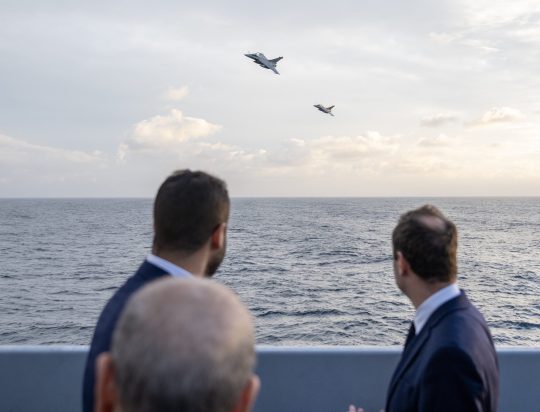
Saudi Defense Minister sees Rafale's demonstration while Riyadh wants 54 aircraft
The kingdom approached Dassault after Germany refused Riyadh's request for Eurofighters.
Fernando Valduga By Fernando Valduga 12/21/2023 - 08:29 in Military
The Saudi Minister of Defense, Prince Khalid bin Salman bin Abdulaziz, today visited the French frigate "Chevalier Paul" in the Mediterranean Sea, in the south of France, where he witnessed an air defense exercise with the participation of a series of Rafale aircraft.
Upon his arrival, His Highness was received by the Minister of the Armed Forces of the French Republic, Sébastien Lecornu, the Saudi Press Agency reported.
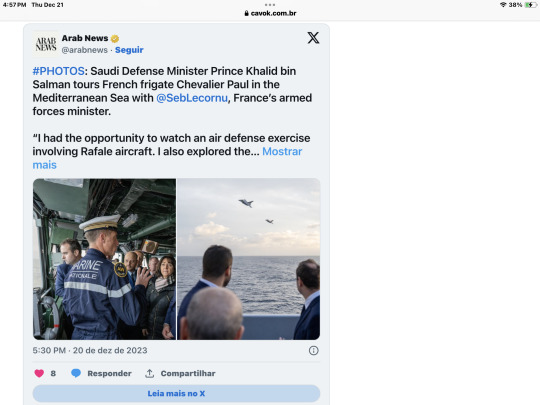
Prince Khalid bin Salman bin Abdulaziz received an explanation that included the capabilities of the Rafale jet and the sophisticated and advanced technologies and equipment it contains.
On Wednesday, the Saudi Defense Minister met with French President Emmanuel Macron, where the duo discussed bilateral relations between France and the Saudi Kingdom.
Separately, the CEO of Dassault Aviation, Eric Trappier, confirmed that Saudi Arabia is negotiating the purchase of 54 Rafale aircraft.
Speaking to the Association of Defense Journalists in Paris on December 14, Eric Trappier said that “although Saudi Arabia has traditionally purchased British aircraft, Saudi Arabia's request for 54 Rafales was “independent of the crisis in the Middle East,” he said, indirectly referring to Germany that blocked Saudi Arabia's request for additional Eurofighters due to the kingdom's intervention in the Yemen civil war.
Tags: Military AviationDassault AviationDassault RafaleRSAF - Royal Saudi Air Force/Royal Saudi Air Force
Sharing
tweet
Fernando Valduga
Fernando Valduga
Aviation photographer and pilot since 1992, he has participated in several events and air operations, such as Cruzex, AirVenture, Dayton Airshow and FIDAE. He has works published in specialized aviation magazines in Brazil and abroad. He uses Canon equipment during his photographic work in the world of aviation.
Related news
The Icelandic Coast Guard regularly transports scientists to observe the volcanic eruption near Grindavik. (Photo: Landhelgisgaesla Islands)
HELICOPTERS
VIDEO: Icelandic Coast Guard takes scientists in helicopter to evaluate volcanic eruption
20/12/2023 - 21:00
An F-35A Lightning II poachback returned to Kadena Air Base, Okinawa, on December 18, 2023, without a panel of the aircraft body. (Photo: Satoru Kuba)
INCIDENTS
F-35A fighter loses side panel while flying over Okinawa in Japan
20/12/2023 - 20:26
MILITARY
F-16 fighters will bring better weapons and radar to the Ukrainian Air Force
20/12/2023 - 17:00
HELICOPTERS
Tata Boeing Aerospace has already manufactured 250 AH-64 Apache helicopter fuselages
20/12/2023 - 16:00
MILITARY
Canada orders the remotely piloted air system MQ-9B SkyGuardian from GA-ASI
20/12/2023 - 12:00
MILITARY
Philippines closest to acquiring Saab JAS39 Gripen fighters
20/12/2023 - 11:00
3 notes
·
View notes
Text
"UNESCO World Heritage Committee Names Hopewell Ceremonial Earthworks to Prestigious List" (19 September 2023):
The UNESCO World Heritage Committee on Tuesday, September 19, 2023 named the Hopewell Ceremonial Earthworks, a group of eight ancient earthwork sites in southern Ohio, to its World Heritage List. The decision by the World Heritage Committee was made by consensus at its 45th session in Riyadh, Saudi Arabia.
The monumental earthworks were built 2,000 years ago by Native American communities. Five of the earthwork sites are managed by the National Park Service and three are managed by the Ohio History Connection.
The destination was applauded by U.S. Secretary of the Interior Deb Haaland (Laguna Pueblo), whose department oversees the National Park Service.
“Today’s designation by UNESCO is a tremendous opportunity and recognition of the contributions of America’s Indigenous Peoples,” Haaland said in a press release. “World Heritage designation is an opportunity for the United States to share the whole story of America and the remarkable diversity of our cultural heritage as well as the beauty of our land. The Hopewell Ceremonial Earthworks are unique creations of America’s indigenous people and a remarkable survival of our ancient history.”
The sites that comprise Hopewell Ceremonial Earthworks were built between 1,500 and 2,200 years ago by people now referred to as the Hopewell Culture. The earthworks, built on an enormous scale and using a standard unit of measure, form precise squares, circles, and octagons as well as a hilltop sculpted to enclose a vast plaza. The geometric forms are consistently deployed across great distances and encode alignments with both the sun’s cycles and the far more complex patterns of the moon. Artifacts, which are among the most outstanding art objects produced in pre-Columbian North America, show that those who built the earthworks interacted with people as far away as the Yellowstone basin and Florida. These are among the largest earthworks in the world that are not fortifications or defensive structures.
The properties comprising the Hopewell Ceremonial Earthworks:
Hopewell Culture National Historical Park in Chillicothe, including the Mound City Group, Hopewell Mound Group, Seip Earthworks, High Bank Earthworks and Hopeton Earthworks
The Ohio History Connection’s Octagon Earthworks and Great Circle Earthworks in Newark and Fort Ancient Earthworks in Oregonia
During a recent vote, the World Heritage Committee members agreed that these earthworks deserve to be recognized alongside such places as Stonehenge in England and the Nazca Lines in Peru, as well as other iconic places in the United States, including Independence Hall and the Grand Canyon. The National Park Service manages all or part of 19 of the 25 World Heritage Sites in the United States. It is also the principal U.S. government agency responsible for implementing the World Heritage Convention in cooperation with the Department of State.
The inclusion of a site in the World Heritage List does not affect U.S. sovereignty or management of the sites, which remain subject only to U.S., state and local laws. Detailed information on the World Heritage Program and the process for the selection of U.S. sites can be found at the National Park Service’s website.
2 notes
·
View notes
Text
News Roundup 8/23/2023 | The Libertarian Institute
Here is your daily roundup of today's news:
News Roundup 8/23/2023
by Kyle Anzalone
Russia
On Sunday, Denmark and the Netherlands became the first countries to pledge they will provide Ukraine with US-made F-16 fighter jets following formal US approval of the transfer. AWC
A Ukrainian military official suggested to The Washington Post that Ukrainian forces are not documenting where they’re using US-provided cluster bombs in Ukraine despite assurances the Biden administration said it received. AWC
Warsaw plans to buy nearly 100 Apache attack helicopters manufactured by Boeing for $12 billion. Until Poland receives the helicopters, the US will provide Apaches to its NATO ally. The Institute
US and Western officials speaking to The New York Times blamed Ukraine’s struggling counteroffensive on Kyiv’s tactics, saying Ukrainian troops are too spread out. AWC
Polish President Andrzej Duda said Tuesday that Russia has been moving nuclear weapons into Belarus and said the deployment changes the “security architecture” of the region. AWC
Airports in Moscow temporarily halted service for the second day in a row on Tuesday as Ukrainian drones again targeted the region, part of Kyiv’s strategy to bring the war to Russian civilians. AWC
The Russian Defense Ministry said Tuesday that its forces destroyed a US-made military boat carrying a Ukrainian assault team near Snake Island in the northern Black Sea. AWC
China
On Monday, Australia’s biggest warship participated in drills with the Philippines and the US in the disputed South China Sea as part of Canberra and Manila’s first-ever bilateral amphibious exercises. AWC
China on Monday hit back at the US, South Korea, and Japan after the leaders of the three nations accused Beijing of “dangerous and aggressive” behavior in the South China Sea. AWC
Korea
North Korean leader Kim Jong Un oversaw a cruise missile test while aboard a naval ship on Monday. Concurrently, the US and South Korea began yet another series of military exercises which Pyongyang views as rehearsals for war and regime change. The Institute
Middle East
Israeli airstrikes near the Syrian capital of Damascus late Monday wounded at least one Syrian soldier, Syria’s SANA news agency has reported. AWC
Human Rights Watch (HRW) reports that Saudi border forces are systematically murdering migrants attempting to cross into the Kingdom from Yemen. The monitoring group said killing refugees had become an official policy of Riyadh. The Institute
Africa
US Africa Command (AFRICOM) said in a press release last week that it launched an airstrike in Somalia on August 15. AWC
Algeria’s national radio reported on Monday that France is planning a military intervention in Niger if Nigerian President Mohamed Bazoum is not released by the junta that ousted him in a July 26 coup. AWC
Read More
2 notes
·
View notes
Text
[Arab News is Saudi Media]
In a phone call [with Abbas], the crown prince reiterated that Saudi Arabia, in communication with all international and regional parties, is exerting all efforts to stop the ongoing escalation and prevent its expansion in the region, emphasizing the necessity of adhering to international humanitarian law and not targeting civilians. He also stressed the Kingdom’s continuous stand by the Palestinian people to achieve their legitimate rights to a decent life, realize their hopes and aspirations, and achieve just and lasting peace, the Saudi Press Agency said Monday.
The White House hasn't given up on the possibility of a Israel-Saudi normalization agreement, though it's no longer a primary focus, according to National Security Council coordinator John Kirby.
9 Oct 23
21 notes
·
View notes
Text
WASHINGTON — The killing of an Israeli Chabad rabbi in the United Arab Emirates shocked many, and illustrated the dangers Jews face around the world.
But if the aim of the attack was to to undermine the Abraham Accords between Israel, the UAE and other Arab nations, Middle East analysts say it could well have the opposite effect: making those ties even stronger.
“If anything, given the Emirati response, and given that I have not seen any Israeli indication that somehow the UAE didn’t take this seriously enough, it seems to be the opposite, that Israel deeply appreciated the UAE response,” said Michael Koplow, the chief policy officer at the Israel Policy Forum, referring to a UAE statement calling the killing of Rabbi Zvi Kogan an “attack on our values.”
“In many ways, it’s only going to lead to a stronger diplomatic relationship,” he said.
Israel and the UAE are both still coping with the fallout from the killing of Kogan, 28, a Moldovan-Israeli emissary of the Chabad Hasidic movement who moved with his wife to Abu Dhabi in 2022, and whose body was discovered on Saturday. Authorities in the UAE on Monday arrested three Uzbek nationals suspected of involvement in his murder, which Israel has called an act of terror.
As authorities investigate who is responsible for Kogan’s death, political circles in Washington, D.C., Israel and the Gulf are asking a related question: What will this do to ties between Israel and the UAE?
The stakes of that question have become especially high in recent weeks. The two countries normalized relations in 2020, in what is known as the Abraham Accords, and their ties have proven resilient even as Israel fights a brutal multi-front war against terror groups in Gaza and Lebanon. Now, President-elect Donald Trump, whose first administration brokered the accords, has vowed to expand them in his coming term beyond the four Arab states that have already signed on, including drawing in Saudi Arabia.
His former aides say that that ambition has not been hindered — and could even be accelerated — as a result of the weekend’s tragedy.
Jason Greenblatt, the former Trump administration envoy to the Middle East, said he was in the UAE when the murder was reported and he encountered nothing but outrage — a sign, he said, that warm feelings are persisting between the countries even as Israel faces protest and opposition across the Middle East and beyond due to the war in Gaza.
“Everyone I met, Emiratis and other nationalities, including other Arab nationalities, were angry about what happened,” Greenblatt, who travels frequently to the region, said in a text to the Jewish Telegraphic Agency.
He added that the Abraham Accords were secure, and that the attack reflected the ability of the perpetrators “to penetrate even extremely secure cities” such as Dubai, where Kogan was last seen.
“To those tying the tragic, cold-blooded murder of Rabbi Kogan to the Abraham Accords and suggesting that the Abraham Accords will now weaken or fail, I strongly disagree,” he said. “The Emiratis abhor this kind of behavior. Of course it’s true that at this moment it may be uncomfortable to be openly Jewish or Israeli. That’s natural given what happened. But not because of Emiratis or the countless other nationalities that live in and thrive in the UAE.”
The UAE is an authoritarian state with strict limits on press freedom and protest, and the message the Emirati government has projected since the discovery of Kogan’s body has been anger and indignation at his killers.
“Zvi Kogan’s murder was more than a crime in the UAE — it was a crime against the UAE. It was an attack on our homeland, on our values and on our vision,” wrote Yousef Al Oitaba, the UAE ambassador to the United States, in a series of tweets on Sunday. “In the UAE, we welcome everyone. We embrace peaceful coexistence. We reject extremism and fanaticism of every kind. We honor Zvi Kogan’s memory by recommitting ourselves to these values.”
Motti Seligson, the director of media for Chabad, told JTA that Chabad, too, was determined to emerge stronger in the UAE following the killing.
Kogan was one of seven emissaries in the country, and Seligson said Chabad would build a center in the UAE in Kogan’s memory. Donations have already begun to come in: Jared Kushner, Trump’s son-in-law who led the Abraham Accords negotiations, pledged $1 million to Chabad in UAE, and soon his brother Josh followed up with a pledge for a matching amount. A fund for Kogan’s widow has so far raised more than $750,000.
“When we’re faced with adversity, we strengthen; when we’re faced with darkness it just means there’s more light to bear,” Seligson said in an interview.
The Biden administration said it was already working closely with the Israeli and UAE authorities to bring those responsible for Kogan’s death to justice. It reinforced the message that the attack was uncharacteristic of the welcome the Emirates had extended to Israelis, who began traveling to the country in large numbers following the Abraham Accords.
“This was a horrific crime against all those who stand for peace, tolerance, and coexistence. It was an assault as well on UAE and its rejection of violent extremism across the board,” said a statement from Sean Savett, a spokesman for the National Security Council.
Israeli Prime Minister Benjamin Netanyahu, in his opening remarks Sunday to the weekly Cabinet meeting, also sounded determined to nurture and strengthen the relationship with the UAE.
“I greatly appreciate the cooperation of the UAE in investigating the murder,” he said. “We will strengthen the ties between us in the face of attempts by the axis of evil to harm the relationship of peace between us. We will strengthen them and we will work to expand regional stability.”
Authorities have not yet determined whether an organization or country is behind the attack. Rich Goldberg, a National Security Council Middle East staffer during Trump’s first term, said the killing had the hallmarks of those seeking to undermine the normalization deal, which also encompass Bahrain, Morocco and Sudan.
He said the perpetrators may have also hoped “to scare the Emirates and the Saudis that there is some sort of penetration of Islamic terrorism that can somehow blow back on their regimes.”
Matthew Levitt, a counterterrorism expert at the Washington Institute for Near East Policy, said the attack, whoever was behind it, was a sign of weakness — an indication that the perpetrators could not reach Israeli officials or hard targets.
“If this is the most they can do, it’s the softest possible target there is, a civilian who really stands out,” he said, referring to how Chabad officials wear visibly Jewish garb in public. “It’s not a government official, it’s not a ballistic missile barrage.”
Goldberg said if anything, the murder should spur the expansion of the Abraham Accords as a sign that attacks like these are ineffectual.
“This is a moment where if you don’t respond in that way, if you pull back from normalization, if you say that Islamic terrorism to sabotage normalization will succeed, then you will see more terrorism,” Goldberg said.
The IPF’s Koplow said one immediate effect could be the diminishment of travel between Israel and the UAE. Currently, there are six or seven flights between the countries a day, a notable exception to other airlines which have stopped flying to Israel while it wages a war on multiple fronts against enemies who fire barrages of missiles.
“If you have fewer Israelis going to the UAE because of security concerns, and that’s obviously an aspect of the relationship that is an important one, that’s going to suffer,” said Koplow.
5 notes
·
View notes
Text
DUBAI, United Arab Emirates (AP) — Yemen's Houthi rebels likely fired an Iranian-made anti-ship cruise missile at a Norwegian-flagged tanker in the Red Sea in December, an assault that now provides a public, evidence-based link between the ongoing rebel campaign against shipping and Tehran, the U.S. military says.
A report by the U.S. Defense Intelligence Agency released Wednesday linked the attack on the Strinda, which set the vessel ablaze, to Tehran, the Houthi's main backer in Yemen's nearly decadelong war. The findings correspond with those of a Norway-based insurers group that also examined debris found on the Strinda.
It comes as the Houthis continue their monthslong campaign of attacks over the Israel-Hamas war, targeting ships in the Red Sea corridor, disrupting the $1 trillion flow of goods passing through it annually while also sparking the most intense combat the U.S. Navy has seen since World War II.
Iran's mission to the United Nations, responding to questions from The Associated Press, again denied arming the Houthis despite the reports.
“We are aware that (the Houthis) have significantly developed their military capabilities relying on their very own sources,” the mission said. "The prolonged war against them is the primary factor behind the expansion of their military prowess.”
The Strinda was coming from Malaysia and was bound for the Suez Canal and then on to Italy with a cargo of palm oil when it was struck by a missile Dec. 11. The attack sparked a major fire on board that the crew later extinguished without anyone being hurt.
Debris found on board later was analyzed by the U.S. military. The DIA compared the pieces of the engine from the missile found on board to the Iranian Noor anti-ship ballistic cruise missile.
“The Iranian Tolu-4 turbojet engine, used in the Noor (missile), has unique features — including the compressor stage and stator — that are consistent with engine debris recovered from the ... Houthi attack on the M/T Strinda,” the DIA report said. A stator is the stationary portion of an engine.
Those pieces match images of a Tolu-4 engine that Iran displayed at the International Air and Space Show in Russia in 2017, the DIA said. Visually, the engines bore similarities in the photographs.
The Noor was reverse engineered by Iran from the Chinese C-802 anti-ship missile, which Iran purchased from Beijing and began testing in 1996 before transfers stopped over a U.S. pressure campaign. The Iranian version is believed to have a range of up to 170 kilometers (105 miles), with an upgraded version called the Qader having a range up to 300 kilometers (185 miles). The Houthis have a look-alike missile to the Qader called the Al-Mandeb 2 with a similar range.
The Norwegian Shipowners’ Mutual War Risks Insurance Association, known by the acronym DNK, also examined the debris following the Strinda attack. The association assessed it was “highly likely” the vessel had been hit by a C-802 or Noor anti-ship cruise missile.
Before the Houthis swept into Yemen's capital, Sanaa, in 2014, the country did not have an arsenal of C-802 missiles. As the Saudi-led coalition entered Yemen’s conflict on behalf of its exiled government in 2015, the Houthis’ arsenal was increasingly targeted. Soon — and despite Yemen having no indigenous missile manufacturing infrastructure — newer missiles made their way into rebel hands.
Iran long has denied arming the Houthis, likely because of a yearslong United Nations arms embargo on the rebels. However, the U.S. and its allies have seized multiple arms shipments bound for the rebels in Mideast waters. Weapons experts as well have tied Houthi arms seized on the battlefield back to Iran.
While the U.S. has previously accused Iran of supplying the missiles the Houthis use in their attacks at sea, Wednesday's report provided photographic evidence for the first time. The report pointed to a seizure stemming from a Jan. 11 nighttime raid of an Iranian dhow traveling near the coast of Somalia, which saw two Navy SEALs killed. The Navy seized parts related to the Noor anti-ship cruise missile, the report said.
The Houthis have launched seaborne attacks since 2016, when they hit the Emirati vessel SWIFT-1 with a missile as it sailed back and forth in the Red Sea between an Emirati troop base in Eritrea and Yemen. They also tried to attack the USS Mason, an Arleigh Burke-class guided missile destroyer, around the same time.
But the Houthi attacks have rapidly escalated since November over the Israel-Hamas war in the Gaza Strip. The rebels have targeted more than 70 vessels by firing missiles and drones in their campaign that has killed four sailors. They have seized one vessel and sank two in the time since.
The Houthis maintain that their attacks target ships linked to Israel, the United States or Britain as part of the rebels’ support for the militant group Hamas in its war against Israel. However, many of the ships attacked have little or no connection to the war — including some bound for Iran, which backs the Houthis.
“The Houthis probably have used Iran-supplied weapons to conduct more than 100 attacks against land-based targets in Israel, Saudi Arabia, the United Arab Emirates, and Yemen and dozens of attacks targeting ships in the Red Sea and Gulf of Aden,” the DIA report said.
Meanwhile early Friday, the private security firm Ambrey reported that a ship traveling in the southern Red Sea saw what appeared to be a missile splash into the sea and another explode in the air nearby.
The U.S. military's Central Command meanwhile reported that it destroyed five Houthi drone boats and two airborne drones in the Red Sea, while destroying another drone in Houthi-controlled territory.
The Houthis did not immediately acknowledge either incident, though it said U.S.-led airstrikes had targeted the Hodeida region Thursday.
10 notes
·
View notes
Text
Saudi Arabia dives into Ukraine war peace push with Jeddah talks
India has also confirmed its attendance in Jeddah, describing the move as in line "with our longstanding position" that "dialogue and diplomacy is the way forward."
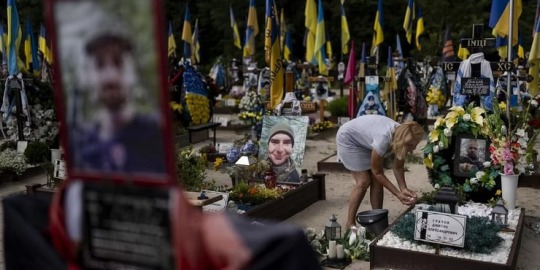
RIYADH: Saudi Arabia was set to host talks on the Ukraine war on Saturday in the latest flexing of its diplomatic muscle, though expectations are mild for what the gathering might achieve.
The meeting of national security advisers and other officials in the Red Sea coastal city of Jeddah underscores Riyadh's "readiness to exert its good offices to contribute to reaching a solution that will result in permanent peace," the official Saudi Press Agency said Friday.
Invitations were sent to around 30 countries, Russia not among them, according to diplomats familiar with the preparations. The SPA report said only that "a number of countries" would attend.
It follows Ukraine-organised talks in Copenhagen in June that were designed to be informal and did not yield an official statement.
Instead, diplomats said the sessions were intended to engage a range of countries in debates about a path towards peace, notably members of the BRICS bloc with Russia that have adopted a more neutral stance on the war in contrast to Western powers.
Speaking on Friday, Ukrainian President Volodymyr Zelensky welcomed the wide range of countries represented in the Jeddah talks, including developing countries that have been hit hard by the surge in food prices triggered by the war.
"This is very important because, on issues such as food security, the fate of millions of people in Africa, Asia, and other parts of the world directly depends on how fast the world moves to implement the peace formula," he said.
Saudi Arabia, the world's biggest crude exporter which works closely with Russia on oil policy, has touted its ties to both sides and positioned itself as a possible mediator in the war, now nearly a year and a half old.
"In hosting the summit, Saudi Arabia wants to reinforce its bid to become a global middle power with the ability to mediate conflicts while asking us to forget some of its failed strategies and actions of the past, like its Yemen intervention or the murder of Jamal Khashoggi," said Joost Hiltermann, Middle East programme director for the International Crisis Group.
The 2018 slaying of Khashoggi, a Saudi columnist for The Washington Post, by Saudi agents in Turkey once threatened to isolate Crown Prince Mohammed bin Salman, the kingdom's de facto ruler. But the energy crisis produced by the Ukraine war elevated Saudi Arabia's global importance, helping to facilitate his rehabilitation.
Moving forward Riyadh "wants to be in the company of an India or a Brazil, because only as a club can these middle powers hope to have an impact on the world stage," Hiltermann added.
"Whether they will be able to agree on all things, such as the Ukraine war, is a big question."
'Balancing'
Russia invaded Ukraine on February 24, 2022, failing in its attempt to take Kyiv but seizing swathes of territory that Western-backed Ukrainian troops are fighting to recapture.
Beijing, which says it is a neutral party in the conflict but has been criticised by Western capitals for refusing to condemn Moscow, announced on Friday it would participate in the Jeddah talks. "China is willing to work with the international community to continue to play a constructive role in promoting a political settlement of the Ukraine crisis," said foreign ministry spokesperson Wang Wenbin.
India has also confirmed its attendance in Jeddah, describing the move as in line "with our longstanding position" that "dialogue and diplomacy is the way forward."
South Africa said it too will take part.
Saudi Arabia has backed UN Security Council resolutions denouncing Russia's invasion as well as its unilateral annexation of territory in eastern Ukraine.
Yet last year, Washington criticised oil production cuts approved in October, saying they amounted to "aligning with Russia" in the war.
This May, the kingdom hosted Zelensky at an Arab summit in Jeddah, where he accused some Arab leaders of turning "a blind eye" to the horrors of Russia's invasion.
In sum, Riyadh has adopted a "classic balancing strategy" that could soften Russia's response to this weekend's summit, said Umar Karim, an expert on Saudi politics at the University of Birmingham.
"They're working with the Russians on several files, so I guess Russia will deem such an initiative if not totally favourable then not unacceptable as well."
2 notes
·
View notes